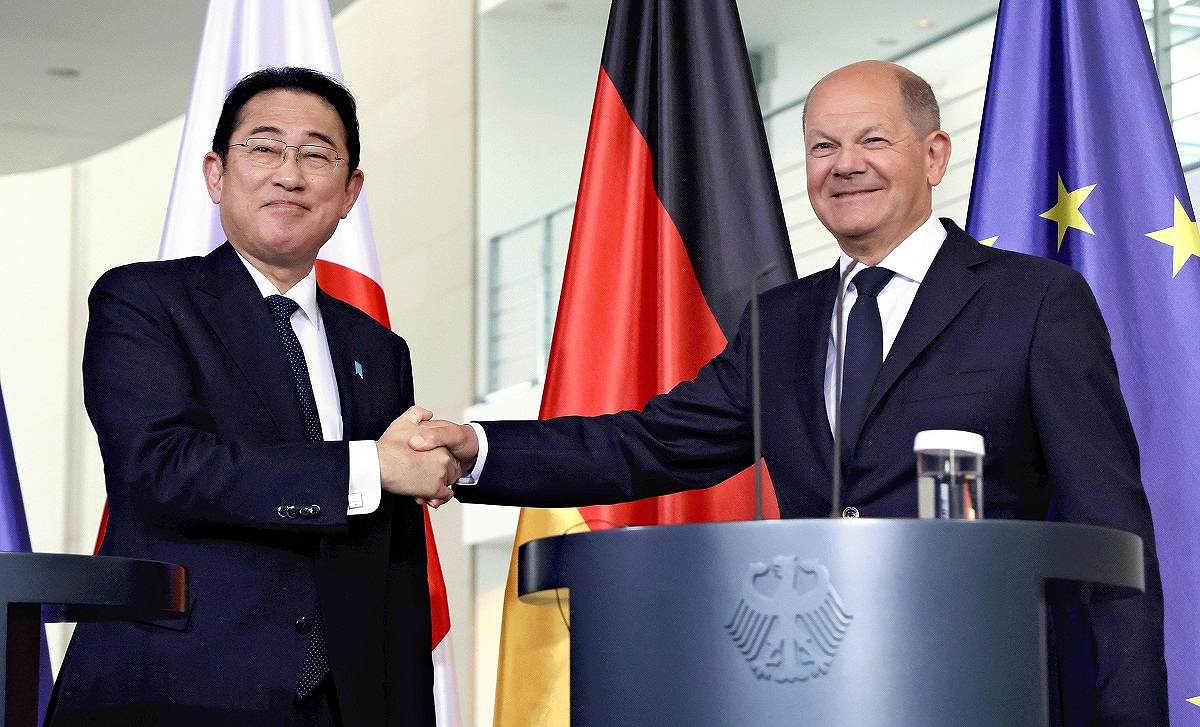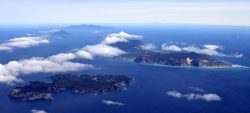Japanese, German leaders Agree to Launch Economic Security Consultation Framework; Combating Economic Coercion

Prime Minister Fumio Kishida, left, and German Chancellor Olaf Scholz shake hands at a joint press conference following their bilateral meeting in Berlin on Friday.
17:32 JST, July 13, 2024
BERLIN — Prime Minister Fumio Kishida and German Chancellor Olaf Scholz met in Berlin on Friday and agreed to establish a new bilateral framework for consultations on economic security.
The move is aimed to counter economic coercion, putting pressure on partner countries through trade restrictions and other measures, with China in mind.
At a joint press conference with Scholz following their meeting, Kishida said, “Sharing the recognition that cooperation between Japan and Germany, which share commonalities in industrial structure and advanced technologies, is important for maintaining and expanding a free and fair international economic order.”
The framework is envisaged to involve senior officials of the Foreign Ministry and the Economy, Trade and Industry Ministry on the Japanese side and their German counterparts from the Ministry for Economic Affairs and Climate Action. Measures to strengthen supply chains for semiconductors and other key products are expected to be on the agenda for consultations.
During the meeting, Kishida and Scholz also agreed to strengthen cooperation in research and development of the “Beyond 5G/6G” new telecommunications standard, as well as cybersecurity and the formation of international rules on artificial intelligence.
For defense, the two leaders welcomed the Acquisition and Cross-Servicing Agreement (ACSA) that took effect Friday, which simplifies the process of exchanging food, fuel and other supplies between the Self-Defense Forces and the German military. They shared their hope that this agreement will promote cooperation between the forces of the two countries.
At the joint press conference, Scholz mentioned a scheduled dispatch of German military aircraft and a frigate to Japan as well as a planned port call of a training fleet of the Maritime Self-Defense Force in Germany this summer. He stated the importance for the two countries to learn to work in close cooperation. Apparently with China’s aggressive maritime advances in mind, Scholz also said that the international law of the sea must be observed.
During the meeting, Kishida and Scholz also confirmed that Japan and Germany will hold intergovernmental consultations in Germany next year. Such consultations were held for the first time in Tokyo in March last year with the two leaders and relevant ministers in participation. They also confirmed that the two countries would coordinate to hold “two-plus-two” security talks of foreign and defense ministers as soon as possible.
Top Articles in Politics
-

Japan PM Takaichi’s Cabinet Resigns en Masse
-

Sanae Takaichi Elected Prime Minister of Japan; Keeps All Cabinet Appointees from Previous Term
-

Japan’s Govt to Submit Road Map for Growth Strategy in March, PM Takaichi to Announce in Upcoming Policy Speech
-

LDP Wins Historic Landslide Victory
-

LDP Wins Landslide Victory, Secures Single-party Majority; Ruling Coalition with JIP Poised to Secure Over 300 seats (UPDATE 1)
JN ACCESS RANKING
-

Producer Behind Pop Group XG Arrested for Cocaine Possession
-

Japan PM Takaichi’s Cabinet Resigns en Masse
-

Man Infected with Measles Reportedly Dined at Restaurant in Tokyo Station
-

Israeli Ambassador to Japan Speaks about Japan’s Role in the Reconstruction of Gaza
-

Videos Plagiarized, Reposted with False Subtitles Claiming ‘Ryukyu Belongs to China’; Anti-China False Information Also Posted in Japan


























